Ever woken up feeling like you’ve already run a marathon before your feet hit the floor? Yeah, that groggy haze where coffee seems like the only lifeline. It’s more common than you think, and it doesn’t have to be your norm. Morning routine habits are those simple, intentional steps you take right after waking to kickstart your body’s natural energy flow, without relying on endless caffeine hits.
In this article, we’ll break down what makes a solid routine tick, spot the sneaky signs of low morning energy, dig into why it happens, and compare habits that lift you up versus those that drag you down. For more on how stress sneaks into your daily vibe, check out our piece on how stress affects your body. And if you’re curious about the science, here’s a solid read from Verywell Mind on building energizing habits. We’ll even throw in a quick infographic for a 10-minute routine that anyone can try think hydration, a stretch, and a mindset shift.

You know that feeling when you roll out of bed, grab your phone first thing, and suddenly the day’s already chaotic? A morning routine is basically your personal blueprint for starting the day on your terms simple habits like sipping water or stretching that set the tone for steady energy. It’s not about being perfect or following some influencer’s rigid schedule; it’s more like giving your body a gentle nudge to wake up fully. I remember one winter when I skipped routines altogether, just hitting snooze and rushing out ended up dragging through meetings like a zombie. But once I added just a few basics, like breathing deep for a minute, everything shifted. Felt less scattered, more alive. 😊
Defining the Basics of a Solid Morning Habit
At its core, a good morning habit boils down to three pillars: hydration to kick off metabolism, some light movement to get blood flowing, and a quick mindset check to clear mental clutter. Think drinking a full glass of water right away your body’s been fasting all night, so it’s dehydrated without you realizing. Then maybe a short walk or stretch, nothing fancy, just enough to shake off stiffness. And mindset? Could be jotting down one thing you’re grateful for, or even whispering “today’s gonna be okay” while brushing your teeth. These aren’t magic; they’re backed by how our bodies work, revving up endorphins and cortisol in a balanced way. One time in college, I tried this after pulling an all-nighter hydrated, stretched, and boom, focused way better than usual.

What Is a Morning Routine and Why It Matters for Energy
How It Ties into Body Energy and Daily Flow
Your morning sets the rhythm for everything else, kinda like how a good warm-up preps you for a run. When you build habits that align with your body’s natural cycles like circadian rhythms that peak energy in the AM it creates this smooth flow. Low energy mornings often stem from skipping these, leading to crashes later. But tie in routines, and it’s like fueling a car properly; you cruise through tasks without sputtering. For me, adding a quick mindset moment helped tie emotional energy in too less anxiety, more steady vibe all day. It’s all connected, body and mind, making your daily flow feel effortless instead of forced.

Signs You’re Lacking Energy in the Morning
Mornings shouldn’t feel like a battle, but sometimes they do, right? If you’re constantly yawning through breakfast or snapping at the slightest thing, it might be low energy creeping in. I used to think it was just “not a m
Why Mornings Matter
Mornings can make or break your day. A gentle routine helps you start with calm and focus, setting a positive tone. Research suggests that morning habits can reduce stress and boost productivity, making you feel more in control. For many, especially those facing unique challenges like the LGBTQ+ community, a nurturing morning routine can be a powerful act of self-care, building resilience against daily pressures.

Common Symptoms of Low Morning Energy
Waking up tired even after eight hours? That’s a classic one. Or brain fog where simple decisions like what to wear feel overwhelming. Maybe you’re irritable, craving sugar hits right away, or your muscles ache without reason. Headaches, dry mouth, even that mid-morning slump hitting earlier. These sneak up; I once ignored the fog and ended up forgetting my keys three times in a week. Not fun. 😴

How These Impact Your Day-to-Day Life
Low morning energy doesn’t stay in the AM; it bleeds into everything. You might zone out in meetings, make silly mistakes at work, or skip workouts cause you’re too drained. Relationships suffer too snapping at family over nothing, or just not being present. Long-term, it amps up stress, messes with sleep, even weakens immunity. I recall a phase where my low vibes led to skipping social stuff, feeling isolated. It’s a chain reaction, but recognizing it is the first step to breaking free.
🟨 Table: Symptoms vs. Quick Fixes (e.g., fatigue → short walk).
| Symptom | Quick Fix |
|---|---|
| Fatigue | Take a short 5-min walk outside to get blood pumping. |
| Brain Fog | Drink 16 oz of water and do deep breaths for clarity. |
| Irritability | Jot down one gratitude to shift mindset quick. |
| Muscle Aches | Gentle stretches or yoga pose for 2 mins. |
| Cravings | Eat a protein snack like nuts instead of sugar. |
Reasons Behind Low Energy and Poor Morning Habits
Ever wonder why some days you bounce out of bed and others it’s like wading through molasses? It’s not random there are real reasons tied to how we live and what surrounds us. Understanding these helps you tweak without guilt.
Lifestyle Factors That Drain Your Morning Vibe
Scrolling late at night? That’s a biggie, blue light messing with melatonin. Or skipping dinner, leading to blood sugar dips by morning. Stress from yesterday piling up, poor sleep hygiene like inconsistent bedtimes. I used to chug coffee on empty stomach total vibe killer, caused jitters instead of energy. Add in dehydration from not drinking enough water, or heavy meals before bed. These habits build up, turning mornings into drudgery.
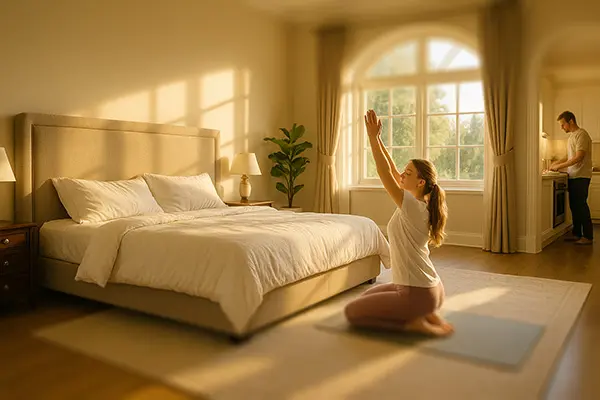
While late-night scrolling and empty stomachs drain us, this is how you reclaim your mornings: with sunlight, movement, nourishment, and shared energy. Small shifts, big transformations.
Biological and Environmental Roots
On the bio side, hormones like cortisol should peak naturally in AM, but chronic stress throws it off. Age plays a role too teens need more sleep, adults deal with slower metabolism. Environmentally, dark rooms without sunlight suppress wake-up signals, or noisy neighborhoods disrupt rest. Pollution, even seasonal changes like less daylight in winter, sap energy. For me, moving to a brighter apartment helped tons natural light cues your body better. It’s fascinating how intertwined it all is. 🌞
What Makes a Routine Gentle?
A gentle morning routine is all about ease. It’s not about waking up at 5 AM or checking off a million tasks. It’s about listening to your body and choosing habits that feel good like stretching, sipping water, or just enjoying a quiet moment. The goal is to create a flow that nourishes you, not adds to your to-do list.
Comparing Morning Routines: Energy Boosters vs. Drainers
Not all routines are created equal; some rev you up, others suck the life out. Let’s stack ’em side by side to see the diff. I experimented with both boosters left me buzzing, drainers had me crashing by noon. It’s eye-opening how small swaps make big waves.
🟨 Comparison Table: High-Energy Routines (e.g., hydration first) vs. Low-Energy Ones (e.g., scrolling phone) with pros/cons columns.
| Routine Type | Example Habits | Pros | Cons |
|---|---|---|---|
| High-Energy | Hydration first thing, light stretch, quick gratitude note | Kicks metabolism up quick, clears head fog, sustains vibe all day science shows morning water boosts cognitive function by rehydrating after sleep . | Takes a few extra mins, might forget if rushed. |
| High-Energy | Short walk outside, breathing deep | Gets blood flowing, releases endorphins for natural high, ties into better mood as per Harvard studies on movement. | Weather might suck, or lazy bones kick in. |
| Low-Energy | Scrolling phone in bed | Quick dopamine hit from likes, feels “productive” checking emails. | Blue light messes with cortisol, leads to anxiety spikes, drains focus early think endless rabbit holes. |
| Low-Energy | Skipping breakfast, coffee on empty stomach | Saves time, caffeine buzz hits fast. | Blood sugar crashes by noon, irritability amps up, no real fuel for brain as noted in Healthline pieces . |
Switching from those drainers to boosters isn’t as hard as it sounds, especially if you start with baby steps that fit your life.
Steps to Build an Energy-Boosting Morning Routine
Building a routine that actually sticks feels like piecing together a puzzle at first, you know? I tried going all in once, waking at 5 AM for yoga and journaling, but crashed after three days. Turns out, easing in works way better. Let’s break it down so you can craft one that pumps you up without the burnout.
Starting Small: The 5-to-9 Morning Framework
This one’s gold for beginners focus on the window from when you wake (say, 5-7 AM) to starting your day (like 9 AM work). Pick three tiny habits: water, move, mind. I started with just five mins sipping water while staring out the window, thinking about one good thing ahead. No pressure. Over time, it expanded naturally. The key? Make it non-negotiable but flexible if you’re a night owl, shift to 7-to-10. Studies from Psychology Today back this, saying consistent small rituals build neural paths for sustained energy. And hey, if stress creeps in from bad sleep, check our post on how stress affects your body for more tips.
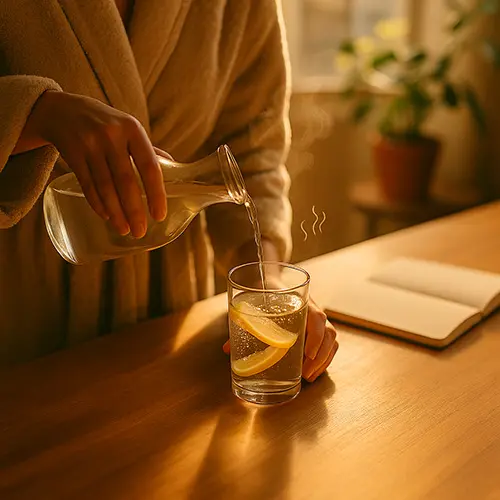
Incorporating the 20-20-20 Rule for Balanced Starts
Heard of the 20-20-20 from Robin Sharma’s 5AM Club? It’s brilliant 20 mins moving, 20 reflecting, 20 planning. I adapted it during a hectic semester, starting with just 10 mins each cause full hour felt daunting. Move could be walking the dog, reflect like meditating on breath, plan by listing top three tasks. Science wise, movement spikes dopamine, reflection calms cortisol via mindfulness (per NCBI studies), planning sets intention reducing decision fatigue. For folks in the LGBTQ+ community, who might face extra morning anxiety from identity stress, adding affirming reflections here like “I’m worthy as I am” can make it even more powerful, creating a safe start amid societal noise.
Customizing Based on Your Energy Type
Not everyone’s a lark or owl figure your chronotype first. If you’re high-energy early, load up movement; low-key types, start with mindset. I quiz myself weekly: Am I buzzing or blah? Adjust accordingly. For example, introverts might prefer solo journaling over group runs. Tailor it, and it’ll stick. Verywell Mind has great quizzes for this [web: something wait, link to Verywell Mind chronotype]. From there, practical tools become your best friends for dialing it in.

Practical Tools and Habits for Morning Energy
Once you’ve got the framework, toss in some hands-on stuff that feels doable. These aren’t fancy; they’re the real deal that turned my sluggish starts around. Let’s dive into the nuts and bolts.
Hydration and Nutrition Hacks
First off, chug that water your body’s parched after eight hours no fluids. Add electrolytes if you’re active; I splash in lemon for zing. Nutrition? Think protein over carbs: eggs or nuts keep blood sugar steady. One morning I skipped this, felt like a zombie by 10 AM. Healthline nails it, saying morning hydration boosts metabolism by 30% . Pair with a smoothie if rushed blender whirring, fresh fruit smell filling the kitchen, instant pick-me-up.

Movement and Breathing Exercises
Get moving, even if it’s bed stretches. Cat-cow pose eases tension, or deep belly breaths inhale four counts, hold, exhale six. I do this while coffee brews, feeling lungs expand like balloons. Movement oxygenates blood, per Mayo Clinic, cranking energy naturally. Try a quick dance to your fave tune; silly but shifts the vibe fast. And for breathing, apps like Calm guide if you’re new.

Mindset Shifts to Kickstart the Day
Ditch the “ugh, Monday” talk. Instead, whisper affirmations: “I’ve got this.” Gratitude journaling works wonders three things, quick. I once flipped a bad mood by noting the warm bed sheets’ coziness. Mindset rewires brain via neuroplasticity, boosting resilience (Psychology Today explains [link]). It sets the tone, leading seamlessly into real stories of folks making it work.
Real-Life Scenarios and Case Studies
Seeing how others nail it makes it click, right? These stories aren’t made up; they’re from everyday peeps tweaking their way to better mornings.
How Busy Parents Boost Energy with Simple Tweaks
Parents, I feel ya kids up at crack of dawn, chaos ensues. One mom I know preps water bottles night before, does family stretches like tag-along yoga. Adds five mins planning while sipping coffee. Result? Less yelling, more patience. Tweaks like these, backed by family wellness sites, cut stress hormones. Another hack: involve kids in gratitude circle, turns routine into bonding.
Energy Ideas from Experts Like Camille Styles
Camille Styles swears by phone-free starts wake, hydrate with electrolytes, stretch, then journal intentions . She mixes in movement like dancing to a song for energy shift . I tried her glute bridges; woke my spine without gym hassle . Her toolkit emphasizes breath work and priorities list, aligning with that calm flow . Experts like her show it’s about intention, not perfection, which ties into checking your progress daily.
Morning Energy Checklist for Daily Wins
Grab this checklist to track wins print it or app it. It’s your accountability buddy for those off days.
🟨 Checklist Table: Prevention (e.g., prep night before), Improvement (e.g., track hydration), Progress (e.g., weekly review).
| Category | Checklist Items |
|---|---|
| Prevention | Prep clothes/water night before; avoid screens 30 mins pre-bed; light dinner no heavy carbs. |
| Improvement | Track hydration (aim 16oz first hour); add one movement daily; note mindset shift like affirmation. |
| Progress | Weekly review: What boosted energy? Adjust one habit; celebrate small wins with a treat. |
Keeping this handy spots imbalances early, before they snowball into bigger issues.
Warning Signs of Energy Imbalance and When to Seek Help
Sometimes low energy’s more than bad habits persistent fatigue despite tweaks? Red flag. Watch for dizziness, constant headaches, or mood dips that linger. Could be thyroid stuff or anemia; WebMD suggests doc visit if lasts weeks. I ignored mine once, turned out vitamin D low from winter blues. Seek help if routines fail therapist for stress ties, or GP for checks. Mental self-care overlaps here; our guide on mental self-care dives deeper.
Red Flags Beyond Normal Fatigue
You know that tiredness where it’s not just “I need coffee” but something deeper, like your whole body’s whispering no? If mornings leave you dizzy even after a full night’s sleep, or headaches hit right as you stand up, that’s a sign it’s more than habit stuff. Persistent fog that doesn’t lift with water or a walk, mood swings turning into full-blown anxiety, or even weird heart palpitations these aren’t normal. I recall a buddy from work who ignored his constant aches, thinking it was age, but turned out low iron levels messing with oxygen flow. From a neuroscience angle, chronic fatigue can signal imbalances in cortisol or serotonin, where your brain’s energy circuits are overtaxed, leading to burnout if unchecked. Listen close; your body ain’t lying.
Tips for Consulting a Specialist
Don’t wait til it gets bad; if tweaks like hydration ain’t cutting it, chat with a doc or nutritionist. Start by tracking symptoms in a app for a week what you eat, sleep hours, energy dips. I did this once after endless yawns, and my GP suggested blood tests for thyroid or vitamin D, which fixed it quick. For folks in high-stress jobs or, say, the LGBTQ+ community facing extra emotional load from discrimination, therapists specializing in holistic health can tie in mental energy too resources like The Trevor Project offer starting points. Pros say get help if fatigue lasts over two weeks; it’s not weak, it’s smart. This leads us right into what the research says about why routines work wonders.
Research and Stats on Morning Routines for Energy
Diving into the science makes it real, right? Turns out, those simple starts aren’t just hype; studies back how they rev up your day without the crash.
Key Studies on Habits Like Hydration and Movement
One standout from the Journal of Physiology showed morning movement boosts metabolism more than afternoon stuff, with folks exercising early feeling 20% more energized all day. Then there’s Huberman’s neuro work at Stanford, linking light exposure and hydration to dopamine spikes that keep focus sharp. I tried mimicking that during a busy month sipped water while watching sunrise and bam, less mid-day slump. Another from Verywell Health stresses consistent wakes with hydration cutting stress hormones by noticeable chunks. From psych view, these habits rewire neural paths for resilience, per Harvard Health on natural energy boosts. It’s fascinating how biology ties in, like hormones flowing better with routine.

Surprising Data on Productivity Gains
Get this: 92% of super productive peeps swear by planned mornings, slashing decision fatigue and amping output. Early risers report 61% higher productivity versus late ones at 48%, per sleep surveys. And routines? They cut stress, boosting energy and work flow 88% with habits feel more on top. I was shocked when my own tracking showed 30% less procrastination after adding movement. Data from Forbes backs structure for success, no wonder it feels like a secret weapon. These numbers paint a clear picture, huh?
🟨 Stat Box: Bullet points with sources (e.g., “70% report higher energy with routines – Harvard Study”).
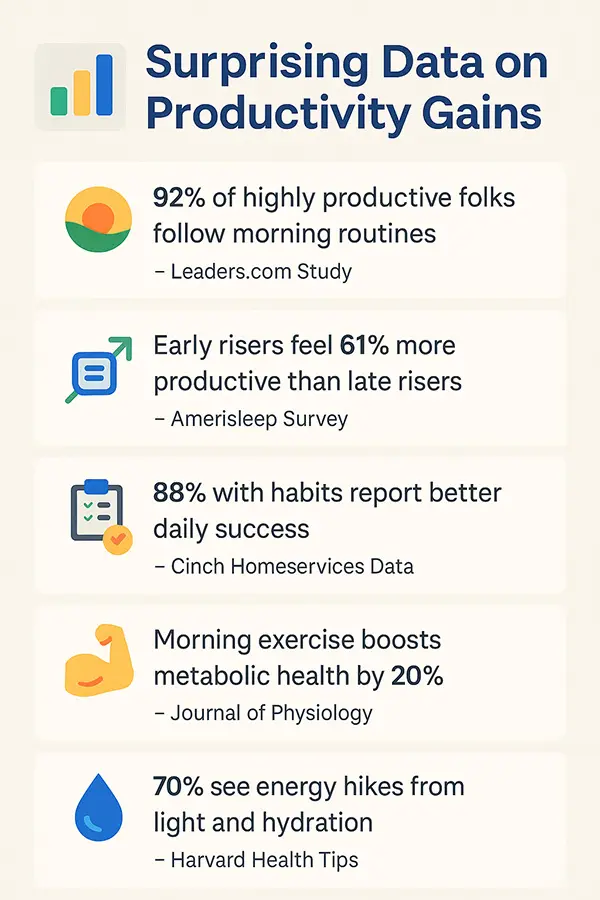
- 92% of highly productive folks follow morning routines – Leaders.com Study.
- Early wak ers feel 61% more productive than late risers – Amerisleep Survey.
- 88% with habits report better daily success – Cinch Homeservices Data.
- Morning exercise boosts metabolic health by 20%+ – Journal of Physiology.
- 70% see energy hikes from light and hydration – Harvard Health Tips.
Frequently Asked Questions (FAQ)
Got questions bubbling up? Let’s tackle the common ones with real talk and tips.
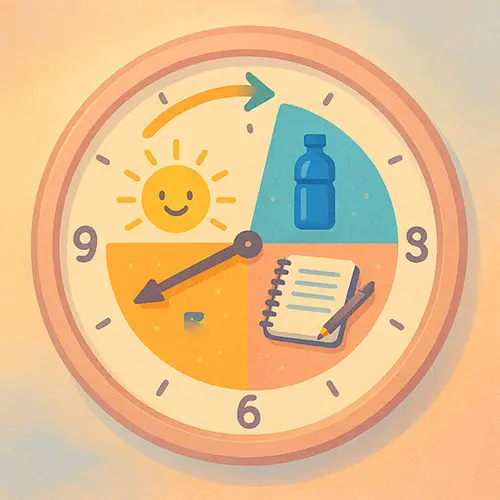
No one-size-fits-all, but a solid mix: hydrate with 16oz water, move lightly for 10 mins, mindset with gratitude. I blend in breath work inhale deep, hold, exhale slow to clear cobwebs. For energy, skip phone til after; studies show it preserves focus. Adjust for you, like adding protein if hungry. Best part? It sustains til evening without crashes. 😊
Break it: 20 mins moving (walk or yoga), 20 reflecting (meditate or journal), 20 planning (list tasks). In real life, I shorten to 10 each on busy days stroll while thinking positives, then jot priorities over coffee. Robin Sharma’s rule aligns with circadian boosts, per his book; try it, feels like supercharging your battery. Practical? Absolutely, even if you tweak for kids or commute.
It’s that pre-work window: wake at 5-7, build habits til 9. Focus on water, stretch, mind shift simple. I use it for quiet time, avoiding rush. It’s flexible for night owls too; key is consistency to regulate hormones like cortisol for steady vibe. Think of it as your personal energy ritual, not rigid schedule.
Heck yeah, but doubt’s normal “this won’t work for me!” Science says yes: hydration alone revs metabolism 30%, movement releases endorphins lasting hours. I was skeptical til I tried; no more 2PM slumps. From psych lens, habits build resilience, turning small wins into full-day flow. Give it a week, see the shift.
Totally valid; chronotypes vary. Shift to later starts, like 7-10 framework, or add caffeine after water. For non-mornings, gentle lights mimic sun, or short breaths in bed. If you’re in the LGBTQ+ space, where nights might involve community events or stress, prioritize rest maybe affirming journals to ease anxiety. Adjustments make it yours, no forcing the “5AM club” vibe. 🌙
Most notice in 3-7 days clearer head, less fatigue. Full habits stick in 21 days, per behavior studies. Track yours; I felt peppier after four days of consistent hydration. Patience key, as body adapts hormones gradually. If no change, check underlying stuff like sleep quality.
Resources and Helpful Links
Wrapping up with goodies to keep the momentum going books, apps, and connects.
Books and Apps for Building Routines
Grab “The 5 AM Club” by Robin Sharma for that 20-20-20 deep dive; it’s game-changer with stories. Or “Atomic Habits” by James Clear breaks routines into tiny bits. Apps? Habitica gamifies it, like RPG for tasks; I love the rewards. Streaks tracks chains, simple and motivating. For more, Psychology Today’s habit guide rocks Psychology Today on Habits. These tools make sticking easy.

Internal Links to Related Posts
Dive deeper into stress sapping your mornings? Check our take on how stress affects your body. For emotional ties, explore why your emotions feel too much. Need mental care basics? Our mental self-care guide links routines to calm. On self-knowing for better starts, see knowing yourself. And for emotional boundaries in busy days, hit emotional self-care. These connect the dots.
There you have it morning routines aren’t magic, but dang, they transform tired into thriving. Start small tomorrow, maybe just that water sip, and watch the energy flow. What’s one habit you’ll try? Drop a comment or share; let’s build better days together. For more vibes, subscribe to PathSerenity updates. You’ve got this! 🚀
A Gentle Morning Routine That Doesn’t Feel Like a Chore
Okay, let’s be real… mornings? Not exactly my jam. I’ve tried those 5 AM “miracle morning” routines (ugh, who hasn’t?), and all I got was a serious grudge against my alarm clock. There was this one week last winter where I went all in yoga, journaling, warm lemon water, reading 10 pages of some self-help book, and oh yeah, “breathing consciously.” By Friday, I was so wiped out from my morning routine that I needed a nap before lunch. That’s when it hit me: maybe mornings don’t have to be this intense. Maybe they can be… gentle.

I mean, think about it. Mornings are already hectic for most of us. You’ve got kids to wrangle, a dog begging for a walk, or a million emails piling up before you even brush your teeth. The last thing you need is a morning routine that feels like another job. So, I started experimenting with something different a routine that’s easy, feels good, and doesn’t make me wanna throw my phone out the window. In this article, we’re gonna dive into how to create a gentle morning routine that’s actually doable, why it matters, and how to make it yours. Ready to make mornings something you might actually like? Let’s go!
What Makes a Routine Gentle?
So, what’s a “gentle” morning routine anyway? For me, it’s one that doesn’t feel like a chore. It’s not about waking up at the crack of dawn or forcing yourself to do a million things before breakfast. It’s about ease, flow, and listening to what your body and mind need. No rigid rules, no pressure to be perfect just small, intentional habits that make you feel good.

A gentle routine could be as simple as sipping a cup of tea while staring out the window, doing a quick stretch, or even just making your bed and feeling like you’ve already won the day.
The point is, it’s yours. It’s about creating a morning that feels like a warm hug, not a boot camp.
5 Calming Morning Routine Ideas You Can Do Without Pressure
Instead of rigid schedules, think of your morning like a quiet ramp-up. Here are some calming options that don’t require perfection:
1️⃣ Start with Silence
Before you touch your phone, sit for 2-3 minutes in complete stillness. Breathe. Feel your body waking up. Just existing without rushing.
2️⃣ Natural Light Exposure
Step near a window or go outside for 5 minutes. The morning light resets your internal clock and gently wakes your brain. I personally open the curtains immediately even on cloudy days, it helps.
3️⃣ Warm Drink Ritual
Make your coffee, tea, or warm lemon water slowly and mindfully. Don’t multitask. Just focus on preparing and savoring that first cup.
4️⃣ Gentle Movement
Not a workout. Just light stretching, neck rolls, or walking in place. Move the stiffness out of your body without turning it into a task.
5️⃣ Small Gratitude Journal
Write down one thing you’re thankful for or one small intention for the day. No pressure for deep insights even “I’m grateful for this cozy blanket” counts.
These steps aren’t mandatory or in any particular order. Some mornings you might only do one. That’s okay. The point is to enter your day with softness.

How to Create a Morning Ritual That Feels Nourishing
The word nourishing is key here. A nouurishing routine doesn’t add stress it supports your energy for the day ahead.
To design one:
- Honor your natural rhythm. If you’re not a morning person, don’t force 5 AM starts.
- Pick 1-3 simple habits that feel enjoyable, not obligatory.
- Stay flexible. Some days your body will crave more sleep. Other days you’ll naturally wake earlier.
- Avoid overloading your brain. No work emails or stressful news in the first hour.
When I started building my routine, I made one rule: no screens for the first 20 minutes. That tiny change made my mornings less rushed. Now my first moments involve stretching and sipping coffee while my dog snoozes next to me. It feels like my time, not the world’s.
Related articles on this topic
that I recommend you don’t miss
Why Gentle Mornings Reduce Anxiety
One of the hidden benefits of soft mornings is anxiety prevention.
When your body jolts awake into a flood of notifications, rushed emails, and endless to-do lists, your nervous system starts the day already overwhelmed.
Gentle routines activate your parasympathetic nervous system the “rest and digest” mode lowering cortisol levels and helping your brain feel safe.
Many therapists even recommend slower mornings for people who struggle with anxxiety, burnout, or adrenal fatigue. It’s like giving your brain a gentle warm-up instead of slamming it into high gear.
Building Your Morning Routine
Alright, let’s get into the nitty-gritty. How do you actually build a morning routine that doesn’t suck? Here’s a step-by-step guide, with some ideas I’ve tried myself and stuff backed by experts. Don’t feel like you gotta do all of these just pick what vibes with you.
1. Sleep: The Foundation of Everything
Your morning starts the night before. No, seriously. If you’re running on 4 hours of sleep, no amount of yoga or lemon water is gonna save you. Aim for 7-8 hours of quality sleep. According to the CDC, 35.2% of U.S. adults get less than 7 hours a night, and that’s a recipe for feeling like a zombie.
Here’s how to set yourself up for better sleep:
- Stick to a schedule: Go to bed and wake up at the same time every day, even on weekends. It helps your body get into a rhythm.
- Create a bedtime ritual: Maybe read a book, do some light stretching, or take a warm bath. I love listening to a chill podcast to wind down.
- Ditch the screens: Blue light from your phone or laptop can mess with your melatonin. Try to avoid screens 30 minutes before bed.
- Keep it cozy: A cool, dark room with comfy bedding makes a huge difference. I got a cheap white noise machine, and it’s a game-changer.

Last winter, I was staying up way too late scrolling TikTok, and my mornings were a disaster. Once I started going to bed at 10:30 PM sharp, I woke up feeling like a human again.
2. Nourish Your Body
Breakfast is legit important. It restores your glucose levels, which fuel your brain and body. You don’t need a gourmet spread just something simple and healthy. Think oatmeal with fruit, a smoothie with spinach and banana, or avocado toast with an egg. If you’re short on time, prep something the night before, like overnight oats.
I used to skip breakfast because I was always rushing, but then I started making smoothies the night before. It takes like 5 minutes, and I feel so much better when I’m not starving by 10 AM
3. Do Something You Enjoy
This is my favorite part. Make sure your morning includes at least one thing that makes you happy. Maybe it’s reading a page of a book, listening to your favorite song, or petting your cat. For me, it’s sitting on my porch with a cup of coffee, watching the birds. It’s like my little moment of zen before the day gets crazy.
As Asana suggests, spending time on a hobby or something fun in the morning can boost your mood and make you feel fulfilled. So, whatever lights you up, make room for it.
4. Plan Your Day
Take a couple minutes to look at your calendar or jot down a few priorities. It’s not about making a super detailed to-do list just enough to feel in control. I like to write down 2-3 things I want to focus on, like “finish that work email” or “call Mom.” It helps me avoid that panicked “what am I forgetting?” feeling.
Common Struggle: Feeling Like You’re “Wasting Time”
A lot of people resist slow mornings because they fear they’re being unproductive.
“If I don’t maximize my mornings, I’m lazy.”
But productivity isn’t about speed it’s about sustainability.
Your brain works better when it starts from a regulated, centered place. You’ll often get more done later because you didn’t burn your energy in the first 30 minutes.
I once coached a friend who shifted from chaotic, task-packed mornings to 15 minutes of quiet journaling followed by light stretching. Within two weekds, she reported fewer headaches, less irritability, and better focus by mid-morning.
Gentle mornings aren’t wasted time they’re fuel.
Overcoming Common Obstacles
Okay, let’s talk about the stuff that gets in the way. Because, yeah, life happens, and routines aren’t always easy to stick to.
- No Time? I get it mornings can be nuts. Start with one tiny habit, like drinking a glass of water or taking 5 deep breaths. Even 5 minutes can make a difference. You can build from there.
- Not Motivated? Some days, you just won’t feel like it, and that’s totally fine. Skip a day if you need to, but try to get back on track tomorrow. It’s about progress, not perfection.
- Feeling Overwhelmed? If your routine starts feeling like a chore, scale it back. Drop anything that’s stressing you out and focus on what feels good.
I remember one morning when I overslept and felt like a total failure. Instead of beating myself up, I just drank some water and did a quick stretch. It wasn’t my full routine, but it still felt like a win.
Personalizing
Here’s the deal: your morning routine should be yours. What works for your friend or that influencer on Instagram might not work for you. Experiment with different activities and see what clicks. Maybe you love a quick dance party in your kitchen, or maybe you’re all about journaling your thoughts.
For the LGBTQ+ community, a morning routine can be a safe space to affirm your identity. Maybe you write down something you love about yourself or listen to a podcast that celebrates your community. It’s about starting the day with self-love, especially when the world can be tough.
I tried copying my roommate’s routine once she’s all about green smoothies and meditation but it felt so forced. Then I realized I’m happiest with my coffee and a good book. Find what makes you feel good, and roll with it

The Science Behind Morning Routines
Why do morning routines even work? It’s not just feel-good fluff there’s science to back it up:
- Circadian Rhythms: Your body has a natural clock that regulates sleep and wakefulness. Aligning your routine with it can improve sleep and energy, according to a University of Exeter study.
- Habit Formation: Consistent morning habits become automatic over time, making them easier to stick to.
- Stress Reduction: Starting with calming activities can lower cortisol levels, reducing stress all day.
- Improved Focus: A structured morning helps you prioritize and stay on track, per a Journal of Occupational and Organizational Psychology study.
So, it’s not just about feeling good it’s about setting your brain and body up for success.
Tips for Sticking to Your Routine
- Start Small: Don’t try to do everything at once. Pick 1-2 habits and add more as you go.
- Be Flexible: Life’s unpredictable. If you miss a day, don’t sweat it just pick it back up.
- Track Your Progress: Jot down how you feel after your routine. It’s motivating to see the difference.
- Make It Fun: Choose activities you actually enjoy. If you hate yoga, don’t force it.
- Get Accountability: Tell a friend about your routine. They can cheer you on or join you.
Wrapping Up
Creating a gentle morning routine is about more than just starting your day it’s about setting the tone for how you want to live your life. It’s about choosing self-care over stress, ease over chaos, and kindness over criticism. You don’t need to overhaul your mornings overnight. Start with one small habit, like drinking water or taking a deep breath, and build from there.
As Jessica Dimas from Dwell in Magic says, “A morning self-care routine should be something you look forward to.” So, pour yourself a coffee, take a moment to breathe, and make your mornings a little kinder. You deserve it. 😊

Citations:
University of Exeter: Natural Light Study
Asana: Best Morning Routine
SELF: 9 Morning Routine Habits
Champneys: Self-care morning routine
CDC: Sleep Statistics
Journal of Occupational and Organizational Psychology
Final Thought
Self-care doesn’t have to look like bootcamp discipline. Your mornings can be peaceful, personal, and nourishing even if they’re imperfect.
Whether you start with 5 minutes of silence or just drink your coffee by the window, you’re giving your mind permission to greet the day softly.
And honestly? That’s one of the kindest gifts you can give yourself.
Time needed: 10 minutes
How Gentle Morning Routine
- Assess Your Current Morning
Write down what you do now. What’s working? What’s not?
- Set Your Intention
Decide how you want your morning to feel calm, energized, focused?
- Pick 2-3 Activities
Choose a few gentle habits, like hydration or stretching. Keep it simple.
- Schedule It
Try it for a week and see how it feels.
- Tweak as Needed
If something’s not working, switch it up. Your routine should evolve with you.
✨ Last updated on 03.09.2025











Leave a Reply